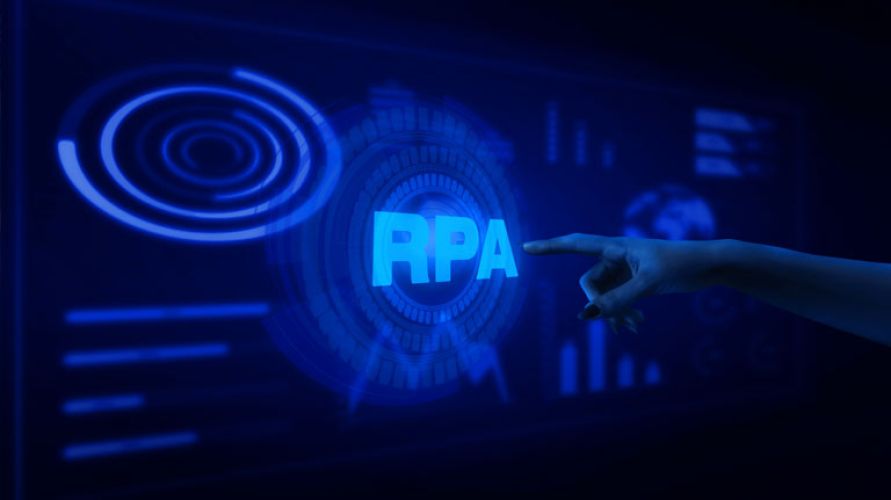
AI-Powered RPA Solutions and Their Benefits for the Legal Industry
AI-powered RPA (Robotic Process Automation) solutions have proven to be a boon for the legal industry. RPA technology can help automate repetitive tasks like document review, contract management, and legal research. By automating these tasks, legal professionals can save time and reduce the risk of errors.
The Future Market Insights report states, “The global legal business sector is anticipated to grow at 4.6% CAGR while attaining a value pool of $627.12 billion by 2030.”
One of the primary benefits of RPA technology is its ability to process large volumes of data quickly and accurately. This can be particularly useful in the legal industry, where lawyers and paralegals are often required to review and analyze vast amounts of information. By using RPA tools, legal professionals can streamline these processes and free up time to focus on higher-level tasks that require human judgment and expertise.
RPA solutions can also help legal professionals manage their workflows more efficiently. For example, an RPA tool can be programmed to automatically generate case files, schedule appointments, and send reminders to clients. This can reduce the administrative burden on lawyers and improve client communication and satisfaction.
Another advantage of AI-powered RPA solutions is their ability to learn from data. As RPA tools are used, they can collect and analyze data about how legal processes are performed. This data can then be used to identify areas for improvement and optimize processes over time.
Speaking of RPA and artificial intelligence, it’s a match made in heaven. Together, they have already impacted many industries, such as retail, healthcare, education, etc. The legal industry is no exception. RPA is a good fit for law firms because of the many voluminous tasks that the legal team must perform on a daily basis as part of their due diligence and compliance responsibilities. Adding artificial intelligence capabilities to RPA in the legal industry allows law firms to improve business processes, realize cost efficiencies at scale, and become more responsive to clients.
In this blog, we’ll look at the combined capabilities of RPA and AI and how they can address the challenges facing the legal industry.
RPA and Artificial Intelligence Capabilities
Applying robotics to any industry is always interesting, but if you can incorporate artificial intelligence into it, it becomes more productive and progressive. AI, as we know it, is artificial intelligence that mimics human intelligence to some extent. In contrast, RPA is a program running on a server to perform several structured, office, and information-intensive tasks.
AI has implications for robotic processes; think of robots working more intelligently, that is, providing sustainability of robotic capabilities. Facilitating AI with bots makes for a cognitive RPA that helps enterprises easily embed AI directly into a task in a cognitive process, i.e., allowing bots to make decisions previously intended for humans.
With AI, a robot can perform various tasks, making precise decisions like humans. Unlike conventional software, AI-equipped robots can read documents and analyze and understand their meaning. AI supports RPA tools to produce predictive results based on unstructured data and volatile processes.
Practical Examples of Using RPA and AI in the Legal Industry
The legal industry faces the challenges of data management in the digital age. Routine tasks such as filing and receiving documents, record keeping, etc., are becoming urgently needed. An efficient workflow that can be accomplished through various programs has become necessary.
Legal services of a traditional nature that, as part of their business, conduct monotonous work with many documents, such as due diligence or KYC procedures, may consider implementing RPA to reduce human effort and errors.
Applying RPA and AI to many legal functions is already possible, and many organizations have already done so. Let’s look at some practical examples of using AI and RPA in the legal industry:
Data-Intensive Paperwork
Like the BFSI industry, the legal industry relies heavily on content and data collection tools. Legal professionals must collect data quickly and accurately to work and comply with regulations. Most professionals suffer from unstructured data, so the need for workflow automation is growing significantly.
Robotic process automation now matches or surpasses intelligent document processing technology with advanced OCR and NLP capabilities. With artificial intelligence, RPA is making data collection smarter than ever by classifying structured and unstructured data. AI-equipped bots can not only copy-paste or collect data but also calculate and analyze it with 100% accuracy and precision.
For example, ASTM International, a 100-plus-year-old standards organization, revised its business model to survive the industry 4.0 revolution. The organization used RPA automation to convert old technical standards written in physical form into digital assets to make life easier for its members.
Compliance Management
The two most important aspects of maintaining effective compliance management for any law firm are diligence and technology. Understanding and addressing these two factors can quickly help firms minimize potential compliance risks and prevent any objections from governing bodies.
With RPA bots powered by artificial intelligence, data compliance can be done automatically. They can quickly track, scan and update changes based on country requirements, eliminating fines and penalties.
Data Protection
Gartner predicts that by 2025, about 30% of enterprises will be ready to use data protection platforms. Due to the growing demand for higher levels of data security, the legal industry must be very attentive to data protection. In addition, there is a growth in automated software capabilities.
RPA bots can easily suspect and address data security risks by generating a suspicious activity report. Such reports provide information about questionable and illegal activity within the firm, allowing the legal team to decide whether to file a report.
Contract Management
Legal contracts often consist of important client-related data. No law firm can bear the consequences if it puts them at risk. Keeping track of relevant data, deliverables, and important events is a major challenge in legal contract management. Therefore, contract management must be optimized.
RPA and AI allow legal professionals to centralize all contract repositories, automate repetitive contract processes and gain some free time for strategic projects. Combined, this helps reduce contract risks, accelerate contract execution, and ensure consistency across teams.
Patent Management
Patent management is a critical task that involves both legal and technical expertise. Legal departments need to manage new and old patents, monitoring patents for possible infringement. This task is time-consuming. If professionals choose a manual approach to this task, it can drag out the process for many days.
RPA innovations allow law firms to digitize the patent approval process and track application statuses. RPA can allow your intellectual property lawyers to computerize the patent document approval process and track application statuses.
Keeping up with the pace of cognitive RPA adoption in the legal industry
The game in the legal industry is more significant than it seems. To stay ahead of the game, you need to take a proactive approach. Given the RPA tools and solutions, they come in handy for the critical tasks of legal institutions, as discussed above. Thus, there should be no second-guessing about implementing RPA into your legal operations.
Many major players in the legal industry have begun to adopt new technologies such as RPA and artificial intelligence. Large law firms use chatbots for marketing purposes and to provide legal advice to clients. However, the application of RPA + AI should be more comprehensive. It should be researched and used to meet the different horizons of the legal world.
In summary, AI-powered RPA solutions are a game-changer for the legal industry. By automating repetitive tasks, improving workflow efficiency, and learning from data, these tools can help legal professionals save time, reduce errors, and deliver better outcomes for their clients.
Consult our team if you’re curious about how this robotic automation can be applied to your legal business.



